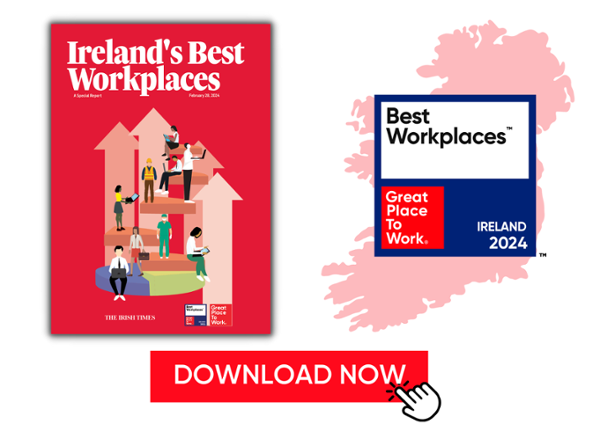Great workplaces realise that parenthood is a factor in the lives of many of their employees 365 days a year and do their best to support them. So, how do the Best Workplaces support working parents and create family friendly cultures?
1. Role modelling
Research indicates that the two most important factors that influence work life balance satisfaction are leadership support and flexibility of working hours. One of the key recommendations for an organisation to develop a family friendly culture is for leaders to role model work-life balance and espouse the importance of time spent with families. (1)
Culture begins with leadership, with their actions heavily influencing employees. Organisations who espouse family values and leaders who openly discuss balancing their commitments with parenthood foster a culture where family commitments are viewed as important. It is then that available supports are availed of fully.
2. Flexible working
Flexible working, including arrangements such as discretionary start and finish times, hybrid and remote working are invaluable for working parents. There are significant benefits for such arrangements for all parties. For the employer, demonstrated benefits include increased organisational commitment, reduced turnover and fewer sick days taken. For the employee, flexible working options have been shown to reduce work-family conflict, reduce stress, and lessen the likelihood of burnout. (2)
To ensure success in this area, Great workplaces focus on internal communication and fairness in decision making. These organisations clearly communicate their remote working policy and ensure decisions made in response to remote working requests are made based on consistent criteria. Businesses who do this well typically report far fewer issues in this area than those who do not and feel the benefits outlined above.

3. Family friendly benefits
Flexible working is one example of a family-friendly policy. Others include health insurance and EAP services which include coverage for families, parental leave benefits, supports for parents returning to the workplace, childcare assistance, adoptive leave, and care leave. Where benefits of this type are offered, work life balance is encouraged and leadership support is evident, the organisation is felt to be a family friendly work environment.
The benefits of creating such a culture are clear for both employees and the organisation. Research indicates that such supports result in significantly reduced work-family balance conflict, increased job satisfaction and commitment, and reduced turnover rates.
Amongst our Great Workplaces, these forms of support are widely offered and availed of, and we certainly see the measurable benefits in relation to engagement and retention.
Check out our podcast with the Irish Rugby Football Union (IRFU), whose family friendly policies have heavily shaped their culture 👇

4. Support networks and resources
While we would sometimes see reports of employee resource groups set up to act as a peer support network for working parents, they truly rose to prominence during the sudden switch to remote working. We heard accounts from organisations offering digital spaces where parents could discuss the challenges they were facing. Perhaps most indicative of a family friendly culture, were examples of experienced parents supporting new parents by offering guidance.
Organisations also offered guidance for parents throughout the sudden switch to ease them into it and to not feel so alone. We received accounts of organisations such as Cpl, that invited parenting experts to speak to their employees virtually and organisations such as Informatica, that offered a range of resources for parents to avail of. Activities such as these reinforce the importance of family within the culture and can be adopted by any organisation to support working parents.

5. Family friendly social events
Most organisations hold multiple yearly social events for employees, and at least one of these events is often tailored to be family friendly. Simple but fun ideas could be Christmas events, trips to places like Tayto Park, or BBQ’s offering opportunities for employees to meet each other’s families.
During the strictly remote period, art competitions, treasure hunts, watch-a-longs and more were provided by organisations to ensure family friendly events were still occurring. Activities such as these strengthen the bonds between employees, show employee spouses what is so great about their partner’s workplaces, and foster a family friendly culture.
6. Building a culture of trust, understanding and support
Where trust exists in an organisation, there is an understanding that all in the business are doing their best to contribute to the success of the group, and there will always be times during working hours where the needs of the family come first. We see Best Workplaces rally to support a colleague in need, and that includes peers suddenly finding their plans upended by home life. This is a team ethos in full swing, and a feature of Great Workplaces we see time and time again.
More resources on this topic:

About Great Place to Work®
Great Place to Work® is the global authority on workplace culture. We help organisations quantify their culture and produce better business results by creating a high-trust work experience for all employees. We recognise Great Place to Work-Certified™ companies and the Best Workplaces™ in more than 60 countries.
To join the thousands of companies that have committed to building high-trust company cultures that help them attract, retain and take care of their people, contact us about getting Certified™ today.

Sources
(1) https://www.acas.org.uk/flexibility-in-the-workplace-implications-of-flexible-work-arrangements-for-individuals-teams-and
(2) https://www.researchgate.net/profile/L-Dulk/publication/227575934_Support_for_the_Work-Life_Balance_in_Europe_The_Impact_of_State_Workplace_and_Family_Support_on_Work-Life_Balance_Satisfaction/links/550be1d80cf290bdc1123c34/Support-for-the-Work-Life-Balance-in-Europe-The-Impact-of-State-Workplace-and-Family-Support-on-Work-Life-Balance-Satisfaction.pdf
